Ageing effects in guppy sperm
Sexual selection is expected to drive intense selection pressure on traits both before and after copulation, and so reduce variation. However, these features remain surprisingly very diverse and one of the main challenges in evolutionary biology is to explain this phenomenon. The EU-funded project AGEING AND RS (The role of ageing in the maintenance of variability in male reproductive success) investigated sperm senescence in the guppy Poecilia reticulata as a possible contributor to diversity. During the first phase of the project, scientists found that ovarian fluid collected from the female genital tract offsets the deleterious effects of ageing on sperm quality. Female guppies can store the sperm for up to six months. During male storage, older sperm showed less motility than their freshly produced counterparts. As sperm motility is a major determinant of competitive fertilisation success in guppies, males with older sperm will not be favoured. As female storage mediates the effects of ageing on sperm, however, it may be that the female uses polyandry or multiple mates to select against aged sperm. The AGEING AND RS team also found that ageing sperm reduces the chances of fertilisation when there is sperm from other males present. Significantly perhaps, this effect is not seen in the absence of competitor's sperm. Sperm ageing also resulted in trans-generational effects on offspring fitness, with male offspring produced by females fertilised by aged sperm producing sperm with slow swimming velocity. This is significant as evidence of a paternal effect on offspring reproductive fitness. An ongoing long-term study looked at male and sperm ageing simultaneously. Preliminary results have revealed that ageing at the organism and gamete level impacts male reproductive success and contributes to variation within that success. Project findings suggest that sperm ageing is an important factor that may shape a number of male and female traits, extending to effects on the offspring. Future results promise to shed more light on how features of male reproductive success can remain diverse despite selection pressures.







